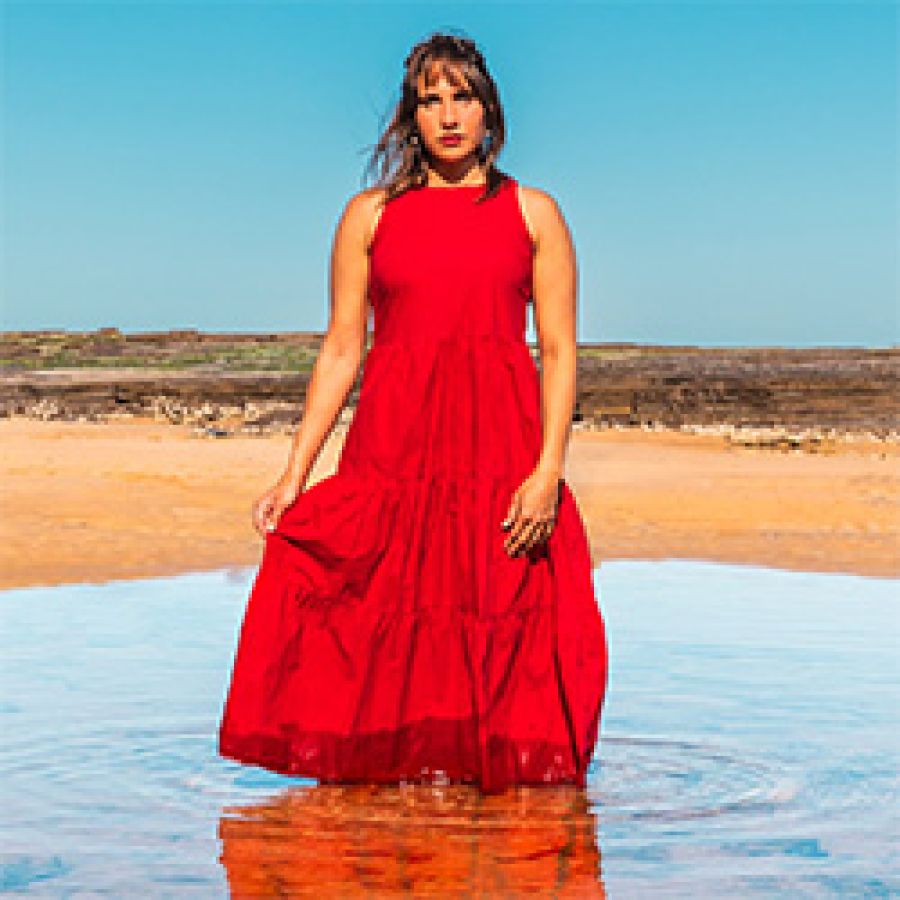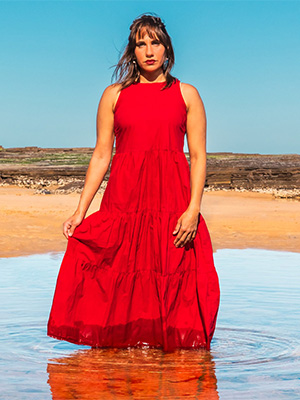
- Free Article: No
- Contents Category: Interview
- Review Article: Yes
- Article Title: Poet of the Month with Kirli Saunders
- Online Only: No
- Custom Highlight Text:
Kirli Saunders (OAM) is a proud Gunai Woman and multi-award-winning writer, artist, singer-songwriter, and consultant. Kirli creates to connect, to make change. She was awarded an Order of Australia Medal for her contribution to the arts in 2022. Kirli is the author of eight books, including Bindi (2020), Returning (2023), Afloat (2024), and Eclipse (2025). Her theatre show Yandha Djanbay will tour in 2026.
Which poets have influenced you most?
Aunty Ali Cobby Eckermann always springs to mind here. It’s like she sewed Country into the pages of her books and little piles of sand fall out and onto your coffee table as you read –something gritty and warm to come back to later. Lulu Houdini is also high on my influence list – she is a doula and midwife, and her words are portals, and ceremonies over and again. Her collection will be out soon. Dakota Feirer: his poetry is soft and strong like a river that shapes the very stone you stand upon as you read. His collection Arsenic Flower is out this September. Dr Tamryn Bennett is a visual poet who taught me so much as a baby poet, and she continuously guides my practice as a writer, encouraging me constantly to welcome plants, music, and art to the page. Grace Lucas Pennington is a stunning poet and an incredible editor, and I’m lucky to have her in my corner and behind the scenes helping me curate and edit my poetry collections. She is undoubtedly my biggest influence.
Are poems chiefly inspired or crafted?
Inspired and then crafted. For me it’s the idea and impulse that keeps me at the table massaging all the pieces together and reworking them for days.
What prompts a new poem?
The wind singing | a dingo snoring | an injustice | a heart breaking |the love that lingers | glittering skies | sea Country | sacred stories handed down | ceremony | the fire crackling | the songs we sing | the dances we stomp | anything that moves me really
What circumstances are ideal for writing poetry?
Time in the sea or bush, a song, podcast, or book to get me thinking, and then once I’ve been moved, time to be still and somewhere cosy, with a book and pen or my laptop and lots of uninterrupted time to write.
Roughly how many drafts do you produce before ‘finishing’ a poem?
It depends largely on the poem, but always multiple – I usually start with a few drafts of the poem itself, then experiment with the layout so that the themes of the work are depicted within the visual presentation of the poem on the page. And after that I’ll get to refining and grammatical edits. And then it’s another round or so with my editor and the typesetter.
Which poet would you most like to talk to – and why?
John O’Donohue’s poem ‘For a New Beginning’ is one I often send to people I care about when chapters are changing. His writing about Connemara in Ireland is truly stunning and his words are a balm. I also love the implementation of any first language as an antidote to colonisation – in his case, it’s Gaeilge.
Do you have a favourite Australian poetry collection?
Guwayu – For All Times (Magabala, 2020) features lots of First Nations writers I adore. There are poems in various First Nations languages and it is edited by Jeanine Leane, a poet I love and respect. Jazz Money’s Mark the Dawn (2024), Dr Tamryn Bennett’s Icaros (2023), Bebe Oliver’s if this is the end (2024), and Sara Saleh’s The Flirtation of Girls / Ghazal el-Banat (2023) are also stunning must-reads.
What do poets need most: solitude or a coterie?
I think for me it is coterie. I’ve been turning poems into songs with Cooee, a music project I’m one half of, alongside Mark Chester-Harding – it’s a good reminder that collaboration leads to deeper creation.
Who are the poetry critics you most admire?
The best critics are also poets, teachers, and writers who are challenging the norms surrounding a genre so I’d say Alison Whittaker, Evelyn Araluen, Natalie Harkin, Shady Cosgrove, Andy Jackson, and Tim Loveday.
If Plato allowed you to keep one poem or poetry collection in his Republic, what would it be?
‘Still I Rise’ by Maya Angelou.
What is your favourite line of poetry (or couplet)?
‘Know the ways of the ones who take care of you, so that you may take care of them … Sustain the ones who sustain you and the earth will last forever.’
Robin Wall Kimmerer, Braiding Sweetgrass (2020).
How can we inspire greater regard for poetry among readers?
My mentor, Dr Tamryn Bennett says, ‘we should live our poem’, and I think if we rethought poetry like this, we’d be more aware of how poems are in everything we do and how we are, but also more broadly how poetry underpins every art form we encounter. Maybe then we would remember that we are a part of the poem – and not something separate from it.



Comments powered by CComment